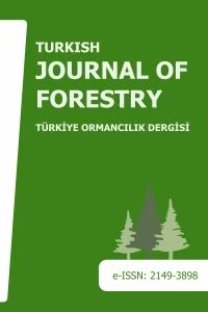Tropikal ormanlardan Türkiye’ye papağan ticaretinin durumu
Egzotik, CITES, Psittacula, Kafes kuşu, Papağan, Popülasyon, İthal, Psittacula
The status of the parrot trade from tropical forests to Turkey
Exotic, CITES, Psittacula, Cage bird, Parrot, Population, Import, Psittacula,
___
- Birdlife International, 2013. Trade in Africa’s Grey Parrots and Timneh Parrots is currently not sustainable. Presented as part of the BirdLife State of the world's birds website. http://www.birdlife.org/datazone/sowb /casestudy/568, Accessed: 07.03.2018.
- Birdlife International, 2008. State of the World’s Birds: Indicators for Our Changing World. Birdlife International, UK, Cambridge.
- Boyla, K., Aydemir, G., Eken, G. 1998. The status and distribution of ring-necked parakeet Psittacula krameri in Turkey. Turna, 1 (1), 24–27.
- CITES Secretariat, 2018. CITES (the Convention on International Trade in Endangered Species of Wild Fauna and Flora), https://www.cites.org, Erişim: 01.02.2018.
- CITES Secretariat, 2017a. CITES Appendices I, II, III, https://cites.org/eng/app/appendices.php, Erişim: 01.06.2018.
- CITES Secretariat, 2017b. CITES Notification to the Parties, Democratic Republic of the Congo, https://cites.org/sites/default/files/notif/E-Notif-2017-063.pdf, Erişim: 01.06.2018.
- CITES Secretariat, 2012. CITES Trade: Recent Trends in International Trade in Appendix II listed species (1996– 2010). UNEP-WCMC, UK, Cambridge.
- Courchamp, F., Angulo, E., Rivalan, P., Hall, R.J., Signoret, L., Bull, L., Meinard, Y., 2006. Rarity Value and Species Extinction: The Anthropogenic Allee Effect. PLoS Biology, 4, 2405–2410.
- Commission Regulation, 2007. Commission regulation (EC) No 318/2007 of 23 March 2007 laying down animal health conditions for imports of certain birds into the community and the quarantine conditions thereof. Official Journal of European Union, 84, 7-29.
- Commission Decision, 2005. Commission decision of 27 October 2005 concerning certain protection measures in relation to highly pathogenic avian influenza in certain third countries for the import of captive birds. Official Journal of European Union, 285, 60-62.
- Daut, E.F., Brightsmith, D.J., Mendoza, A.P., Puhakka, L., Peterson, M.J., 2015. Illegal domestic bird trade and the role of export quotas in Peru. Journal for Nature Conservation, 27, 44 - 53.
- Environment and Climate Change Canada, 2017. Changes to international trade controls for African grey parrots, Cat. No.: CW66-561/2017E-PDF, ISBN: 978-0-660-09034-4.
- Iñigo-Elias, E.E., 2007. Parrots of the World: An Identification Guide. The Auk, 124 (3), 1099-1101.
- IUCN, 2018. Birds. https://www.iucn.org/theme/species/ our-work/birds, Erişim: 07.04.2018.
- Kantarlı, S., 2006. Yaban Hayatı Ticareti. Türkiye Tabiatını Koruma Derneği, Tunç Reklam Tanıtım Hizmetleri, Ankara.
- Kirwan, G.M., Boyla, K.A., Castell, P., Demirci, B., Özen, M., Welch, H., Marlow, T., 2008. The Birds of Turkey. Christopher Helm, London.
- Leader-Williams, N., Tibanyenda, R.K., 1996. The Live Bird Trade in Tanzania. IUCN Gland, Switzerland and Cambridge, United Kingdom.
- Menchetti, M., Mori, E., 2014. Worldwide impact of alien parrots (Aves Psittaciformes) on native biodiversity and environment: a review. Ethology Ecology & Evolution, 26: 2-3, 172-194.
- Orman ve Su İşleri Bakanlığı, 2018. Kongo’dan kaçak yollarla gönderilen 341 Afrika Gri Papağanına İstanbul gümrüğünde-el konuldu. http://www.ormansu.gov.tr/ haber, Erişim:09.01.2018.
- Per, E., 2018. The spread of the Rose-ringed Parakeet, Psittacula krameri, in Turkey between 1975 and 2015 (Aves: Psittacidae), Zoology in the Middle East. DOI: 10.1080/09397140.2018.1511294.
- Per, E., 2017. The first report and preliminary observations on escaped parrot species (Psittaciformes) in Turkey through citizen science. Bird Census News, 2017, 30/2, 47–52.
- Pires, S.F., 2012. The illegal parrot trade: A literature review. Global Crime, 13, 176–190.
- Reino, L., Figueira, R., Beja, P., Araújo, M.B., Capinha, C., Strubbe, D., 2017. Networks of global bird invasion altered by regional trade ban. Science Advances, 3(11), e1700783. Rosser, A.M., Mainka, S.A., 2002. Overexploitation and species extinctions. Conservation Biology, 16, 584–586.
- Tarım ve Orman Bakanlığı, 2018. Psittaciformes Tanımlama Kılavuzu, CITES Türkiye, Tarım ve Orman Bakanlığı, http://cites.ormansu.gov.tr/cites/Files/CITES %20Psittaciformes.pdf, Erişim: 14.02.2018.
- Türkiye Papağan Sayımları, 2018. Gözlem formu, http://tinyurl.com/zl6k34d, Erişim: 01.08.2018.
- UNEP-WCMC, 2018. CITES Trade Database. Cambridge, UK http://trade.cites.org/, Erişim: 02.02.2018.
- UNEP-WCMC, 2016. EU Wildlife Trade 2014: Analysis of the European Union and candidate countries’ annual reports to CITES 2014.
- Vall-Llosera, M., Su, S., 2018. Trends and characteristics of imports of live CITES-listed bird species into Japan. Ibis, DOI: 10.1111/ibi.12653.
- World Parrot Trust, 2004. Deadly Newcastle disease discovered in parrots and other birds imported from Pakistan to Italy. https://www.parrots.org/pdfs/our_ publications/psittascene/2004/04May59.pdf. Erişim: 20.07.2018.
- ISSN: 1302-7085
- Yayın Aralığı: Yılda 2 Sayı
- Başlangıç: 2000
Kahramanmaraş Kağıt Fabrikasında fiziksel risk etmenlerinin araştırılması
Ahmet TUTUŞ, Nevres DEMİR, Mustafa ÇİÇEKLER, Hasan SERİN
Tropikal ormanlardan Türkiye’ye papağan ticaretinin durumu
İsmail Özlüsoylu, Abdullah İstek
Eskişehir ili Karaören köyü merasının vejetasyon özelliklerinin belirlenmesi
Ahmet Alper BABALIK, Ali ERCAN
Örgütsel bağlılık, sinizm, yabancılaşma ve ormancılık örgütleri
Lignin polipropilen kompozitlerinde ara yüzey kimyasallarının mukavemete etkisi
M.ozgur SEYDİBEYOGLU, Tuğçe UYSALMAN, Ece YAKKAN, Metehan ATAGÜR, Kutlay SEVER
Türkiye’de ormancılık örgütü ve yönetimine ilişkin R’WOT analizi uygulaması
Murat KÖSE, İsmet DAŞDEMİR, Seçil YURDAKUL EROL, Hasan Tezcan YILDIRIM, Avni ARSLAN, Emre GÖKSU, Umut Ahmet ŞEKERCAN, Süleyman ALKAN
Sevgin ÖZDERİN, Ferah YILMAZ, Hakan ALLI
Isparta ili Çatoluk ormaniçi merasının vejetasyon yapısının belirlenmesi
